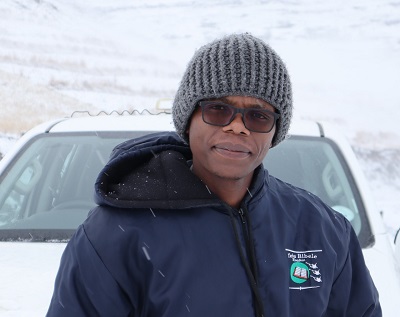Amongst the Basotho culture, there is a distinguished belief that meat is a core dish for every plate.
Basotho people embrace meat entirely as a vital part of any meal to be presented on special occasions.
In winter, they slaughter livestock such as sheep, goat or cattle, and enjoy together as families and societies.
While numerous people find so much fulfilment in meat, astonishingly there are those who completely abstain from meat consumption and entire animal products such as dairy milk, eggs, ham, bacon, polony and others. Surprising right? Yes, and they are called vegans.
Meet Phutheho Thinyane, a Mosotho man who cradles from a humble background, born and bred in the district of Butha-Buthe. During the early stage of his life, he used to enjoy meat like other people and leaving meat out of his meals was something which he had never imagined by then.
However, in the year 2024 he gladly celebrates and commends the decision he took of becoming vegan, as he embraces his eleventh (11th) year since he has joined the vegan society.
What might have led to this significant transition is a documentary entitled “Animal Revenge”. The documentary came as an eye-opener to him as it showcased how animals are ill-treated in factory farms, diseases that are associated with meat-eating, and the testimonies that were shared by people who reversed cancer, hypertension and type-2 diabetes by simply discarding meat from their plates.
Henceforth, he needed not to be convinced otherwise in regard to why he should not continually make use of meat. It was at that stage when he made up his mind with the intention to be fit and healthy for as long as he lives, committing to himself that not an ounce of meat will enter his stomach going forward.
Just after he discarded meat, he mentions the results to have been incredible, as frequent headaches, mood disturbances, sometimes fatigues and bloating are no longer part of his problems.
One thing that stands out for him is that a meat-free diet has boosted his memory immensely! He affirms that he made the right decision. This shows that it is not every time that when people die of sickness they are actually sick, but sometimes there are food stuff that must be discarded in order to regain healthy living.
Though the journey has been worth it, it has not been as easy as it sounds. Sometimes he feels like an outcast or unwelcome, especially in family gatherings and/or in business meetings/trips when meals are served, as he receives unusual comments often directed to vegans,
“Oh, we don’t have anything for vegans…you’re too choosy, but why don’t you eat meat?”
Besides that, scarcity of healthy products in our grocery shops and the issue of climate change affecting agricultural produce do pose a critical risk to vegans.
The vegan lifestyle is not for wealthy individuals, it does not call for fancy food, but seeks the ability for one to produce and grow his own food.
Vegan life calls for self-sufficiency and ability to grow one’s food. In every social class, there is a type of food satisfactory to vegans. This is the direction taken by Thinyane, as now he has ventured into small-scale farming while on a mission of researching and implementing the conversation about organic farming methods that are simple and relevant to the current climatic conditions.
Currently he substitutes meat with lentils, chickpeas, soy protein and beans.
He mentions that more often than not illness take heed owing to one’s own negligence. Although they perceive the vegan diet expensive now, in future the cost for treatment expenses becomes more expensive.
To eat healthy is another form of medication. He mentions that according to WHO Cancer fact sheet of February 2022, “Cancer is a leading cause of death worldwide, accounting for nearly 10 million deaths in 2020, or nearly one in six deaths.”
And one of the contributing factors of cancer is a low fruit and vegetable intake. So, if one adopts a vegan diet, he/she would not only lessen the risk of suffering from cancer, but other chronic diseases like stroke, hypertension, type -2 diabetes are alleviated as well.
“Why eat cheap junk and later pay thousands of money to perform surgeries and die prematurely?” he asks. As Thinyane concludes, he highly recommends that Basotho take interest in the read The China Study: The Most Comprehensive Study of Nutrition Ever Conducted and the Startling Implications for Diet, Weight Loss and Long-term Health by T. Colin Campbell and his son, Thomas M. Campbell II, which unfolds the importance of healthy eating.
Thinyane quotes, “Meat and meat products, fried, spices, excessive fat, and refined products, should gradually be substituted by a variety of fruits, nuts, whole grains, legumes, greens and vegetables prepared in a simple way…this adaptation period toward a healthier diet should be slow. For some, this change may be effected in a few weeks. For others, however, the process may take longer.” Dr. George Pamplona Roger in his book, 250 Recipes for Healing & Prevention, p. 37. Perhaps discarding meat, could be the nearest route to living more meaningful healthy life.


